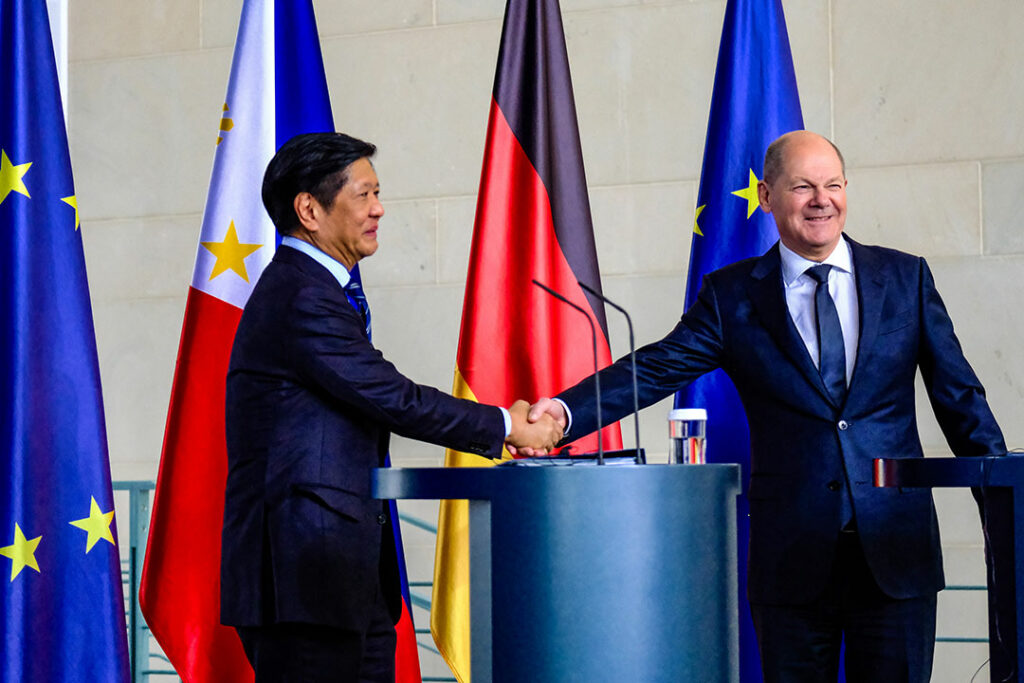




January Economic Update: Growth slows, prices rise
 DOWNLOAD
DOWNLOAD

Inflation Update: Up, up, and away?
 DOWNLOAD
DOWNLOAD

Quarterly Economic Growth Release: Growth takes on a slower pace
 DOWNLOAD
DOWNLOAD


PH secures USD4B in German pledges

German companies on Tuesday pledged USD 4 billion (P220 billion) worth of investments to the Philippines, President Ferdinand R. Marcos, Jr.’s office said, as the Southeast Asian nation seeks to boost economic ties with “like-minded” nations.
Mr. Marcos hopes companies seeking to cut risk and diversify their supply chains amid geopolitical tensions would consider the Philippines, which has been behind its regional peers in attracting foreign direct investments (FDI).
During a Philippine-German business forum in Berlin on Tuesday, Manila secured eight agreements, three of which were letters of intent, including one seeking the creation of an Innovation Think Tank hub.
There were two memoranda of agreement and three memoranda of understanding, one of which was a proposal to establish a fully integrated solar cell manufacturing facility in the Philippines.
The Philippines entered into a public-private partnership with a German company to rehabilitate, reclaim, and recultivate degraded farmlands, the Palace said in a statement.
There was also an agreement to expand potential collaborations in mobility solutions, software services, manufacturing, factory automation, logistics services, energy, security, and safety systems for buildings, consumer appliances, and healthcare, it added.
One of the three memoranda of understanding involved a plan by the German side to invest in a Philippine manufacturing facility that will modify automobiles into high-end one-of-one versions and armor protected cars, as well as manufacture military-grade personnel carriers for the Asian market.
Another memorandum of understanding involved a German company’s plan to put up data centers in the Philippines that will host a digital insurance platform for Southeast Asian markets.
Germany is the largest economy in Europe and is the third-largest economy in the world after the United States and China, which has been locked in a territorial dispute with the Philippines for decades.
At the business forum, Mr. Marcos positioned the Philippines as a regional hub for smart investments, even though the country has the highest electricity rate in Asia.
He said both Manila and Berlin have “aspirations for de-risked and diversified production and market value chains,” citing the need to “future-proof” economies in the face of “geopolitical vagaries.”
He recognized Germany as a global leader in energy storage technology for renewables, saying the Philippines seeks the European nation’s help in pursuing renewable energy projects.
In a joint press statement with German Chancellor Olaf Scholz following their meeting, Mr. Marcos said his country would like to cooperate with Germany in the areas of manufacturing, construction and infrastructure, information technology and business process management, innovation and startups, as well as renewable energy and minerals processing.
‘LIMITED’
Leonardo A. Lanzona, who teaches economics at the Ateneo de Manila University, said the pledges appear to be “mainly exploratory in nature.”
“Much depends on how well the country can ensure the viability of these projects,” he said in a Facebook Messenger chat. “Given very high energy costs and a largely unskilled labor force, the likelihood that these projects in this country will push through are quite limited.”
Last year, the Philippine Labor department said the country lacks about one million skilled workers in engineering, architecture, and construction.
Filipino students were still among the world’s weakest in math, reading and science, according to the 2022 Program for International Student Assessment, with the Philippines ranking 77th out of 81 countries and performing worse than the global average in all categories.
During Mr. Marcos’ visit, the Philippines’ Technical Education and Skills Development Authority and Germany’s Federal Institute for Vocational Education and Training signed a cooperation agreement aimed at upskilling and reskilling Filipino workers.
Mr. Marcos has already made over 20 international trips since assuming office in June 2022.
About PHP 1.408 billion has been allocated for his domestic and international travels in 2024, a 58% increase from just PHP 893.57 million last year.
In 2023, when Mr. Marcos left the country 11 times, the Philippines’ FDI net inflows hit only USD 8.9 billion, a 6.6% decline from USD 9.5 billion recorded in 2022.
China was the first country he visited last year, bringing home P22.8 billion in investment pledges from Chinese investors.
But his visit to the world’s second-largest economy didn’t stop China from harassing Philippine vessels within Manila’s exclusive economic zone in the South China Sea, with the Chinese coast guard using a military-grade laser against its Filipino counterpart in February 2023.
Amid uncertainties hounding Philippines-China relations on the economic front, Mr. Marcos said before leaving Manila for Germany that his country needs to step up economic ties with “like-minded nations.”
The Philippine leader, in a speech before the Filipino community in Germany on Tuesday night, said German investors should consider what the Philippine labor force can offer.
“I told them, if Germany lacks workers, why not establish factories in the Philippines? They will have many brilliant, hardworking and trustworthy Filipino workers to choose from,” he said.
“Setting up manufacturing companies in the Philippines will address the labor shortage Germany is currently facing,” he added, “and will provide our workers jobs which will keep them home with their families.”
Mr. Marcos was set to arrive in the Czech Republic on Wednesday, where he is expected to sign a deal on labor cooperation. — By Kyle Aristophere T. Atienza, Reporter
This article originally appeared on bworldonline.com





 By BusinessWorld
By BusinessWorld